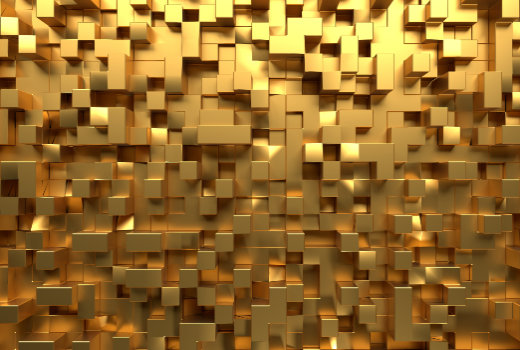Figure of the month: 18
Figure of the month: 18
Gold is surprisingly heavy – as anyone who has ever held an object made of it can confirm. The weight of gold is particularly noticeable in very small pieces. If, for example, you were to take a piece of sugar in one hand and a piece of gold of exactly the same size in the other, the precious metal would be much heavier than the sugar cube – around 18 times heavier, to be precise. Granted: the fact that that gold is much heavier than sugar is no surprise. But 18 times? That is 18 pieces of sugar in one hand, a tiny piece of gold in the other. It should thus come as no surprise that gold is one of the heaviest metals on the planet, significantly heavier even than the heavy metal lead.
Only six elements have a higher density than gold
“Heavy” is a relative term; after all, a kilo of sugar weighs no less than a kilo of gold. When we call an object heavy, we usually mean its weight in relation to its dimensions. This mass-volume ratio is called “density”, calculated in grams per cubic centimetre. A comparison of the density of gold with that of minerals or other metals demonstrates how heavy gold actually is. Marble has a density of 2.7 g/cm3, while iron has a density of 7.9 g/cm3 and lead 11.4 g/cm3. Gold easily tops these numbers with a density of 19.3 g/cm3. However, this does not make it the heaviest element, and not even the heaviest precious metal, an honour which goes to platinum with a density of 21.45 g/cm³. The elements osmium, iridium, rhenium, neptunium and plutonium are also heavier than gold. Incidentally, the chemical element tungsten has almost exactly the same density as gold, which is why gold counterfeiters like to use it to produce fake gold bars with a tungsten core. However, there are various methods for checking the authenticity of gold, which make it possible to expose even such quite sophisticated fakes.
15 elements on earth are rarer than gold
Gold is the most valuable of all precious metals – even platinum costs only a little more than half as much – yet it is not the rarest: in the ranking of the rarest elements in their pure form on earth, gold only ranks 16th. In nature, thalium, uranium, plutonium, bismuth, polonium, astatine, radon, francium, radium, actinium, thorium, protactinium, neptunium, lead and mercury occur even more rarely than gold.
This is due to a simple fact which also explains the precious metal’s high price: experts believe that the world’s oceans alone contain an average of 25 tonnes of gold per cubic mile of seawater. In global terms, that would amount to roughly 10 billion tonnes of gold. More conservative estimates place the figure at 20 million tonnes. However, according to the current state of technology and science, virtually none of this gold can be extracted and is therefore just as inaccessible to mankind as the gold in the earth’s core and on the sun. A 2014 study by the University of Liège states that the sun supposedly harbours around 2.34 trillion tonnes of gold. Apart from that, however, gold is rarer in space than on Earth. In the frequency ranking of the elements within our universe, gold ranks seventh to last. In other words: there are only six elements in space that are even rarer.
Arnulf Hinkel
Financial journalist
Sign up for the Xetra-Gold newsletter to not miss the next figure of the month!
Xetra-Gold Hotline

Do you have questions? We have the answers. Contact us here: 9 a.m.–6 p.m. CET
xetra-gold(at)deutsche-boerse.com
For press inquiries: media-relations(at)deutsche-boerse.com
